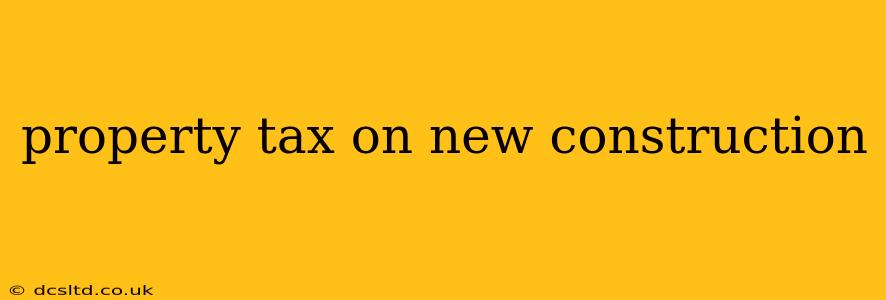Buying a newly constructed home is an exciting milestone, but understanding the complexities of property taxes on new builds is crucial. This guide will delve into the intricacies of how property taxes are assessed on new construction, addressing common questions and concerns.
What is the property tax rate on new construction?
The property tax rate on new construction isn't a fixed number; it varies significantly based on your location. Each county, municipality, and even school district has its own tax rate. These rates are determined by the local government's budget needs and the assessed value of properties within its jurisdiction. To find the precise tax rate for your new home, you'll need to contact your local tax assessor's office or check their website. They will typically provide a tax rate expressed as a percentage or dollars per $1,000 of assessed value.
When do property taxes start on a new construction home?
Property taxes on new construction typically begin once the building is deemed complete and the construction is finalized. This usually means the Certificate of Occupancy (CO) has been issued. The CO certifies that the property meets all building codes and is ready for occupancy. The date of issuance of the CO is frequently the trigger for the commencement of property tax assessments. However, some jurisdictions may use the date of completion or the date the property is sold as the starting point. It's vital to clarify this with your local tax authority to avoid any unexpected bills.
How are property taxes assessed on new construction?
The assessment process for newly constructed properties involves several key steps:
- Appraisal: A professional assessor visits the property and determines its market value. They consider factors such as size, location, features, and comparable sales in the area.
- Classification: The property is then classified based on its use (residential, commercial, etc.). This classification affects the tax rate applied.
- Assessment: Based on the appraised value and the applicable tax rate, the property tax amount is calculated. The assessed value might not be the exact same as the market value; it's the value assigned for tax purposes. This can be a percentage of the market value, varying between jurisdictions.
Are there property tax exemptions for new construction?
Some jurisdictions offer property tax exemptions or abatements for new construction, particularly to incentivize development. These exemptions may be temporary, reducing or eliminating property taxes for a specific period, usually the first few years. The availability and specifics of such exemptions depend entirely on local laws and regulations. It's crucial to inquire with your local tax assessor's office about any applicable exemptions in your area.
How are property taxes calculated on new construction?
The calculation of property taxes on a new build follows a standard formula:
Property Tax = Assessed Value x Tax Rate
For instance, if your home has an assessed value of $300,000 and the tax rate is 1.5%, your annual property tax would be $4,500 ($300,000 x 0.015). Keep in mind this is a simplified example, and many jurisdictions utilize more complex formulas. Always verify your tax calculation with the official assessment provided by your local tax authority.
What is the difference between assessed value and market value?
The assessed value is the value placed on the property by the government for tax purposes, while the market value is the estimated price the property would sell for in the open market. These values may differ; the assessed value may be a percentage of the market value, or the method of calculating assessed value varies significantly by location. It's not uncommon for the assessed value to be lower or higher than the actual market value.
How can I appeal my property tax assessment on a new construction home?
If you believe your property's assessed value is inaccurate or unfairly high, you have the right to appeal the assessment. The process usually involves submitting a formal appeal to your local tax assessor's office, providing evidence supporting your claim. This may include comparable sales data, professional appraisals, or other relevant documentation. The assessor's office will review your appeal and may adjust the assessment accordingly.
This guide provides a general overview of property taxes on new construction. Remember to consult your local tax assessor's office for precise information specific to your location and newly built property. Understanding the process early can significantly help you manage your financial expectations related to your new home.
